Times are Weird, Read a Book
Or at least go down a few research-fueled Wikipedia rabbit holes.
What does the phrase “intellectual curiosity” mean to you?
Does it conjure images of stodgy professors standing before a blackboard, emploring you to grab life by the horns (or some other over-used cliché)?
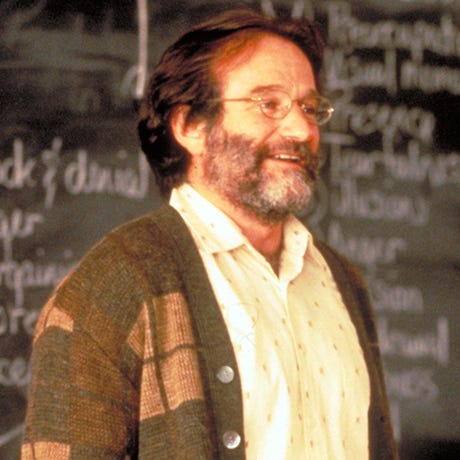
Well, I can promise you my image is very different: it’s my mom.
Non-professor. Non-stodgy. Rare user of clichés. Definitely does not own a jacket with elbow patches.
My mom has been an avid reader for as long as I can remember (and a whole lotta years before then, too).
Her childhood stories often include her mother (my grandmother) physically nudging her to pull her nose out of a book and return to reality.
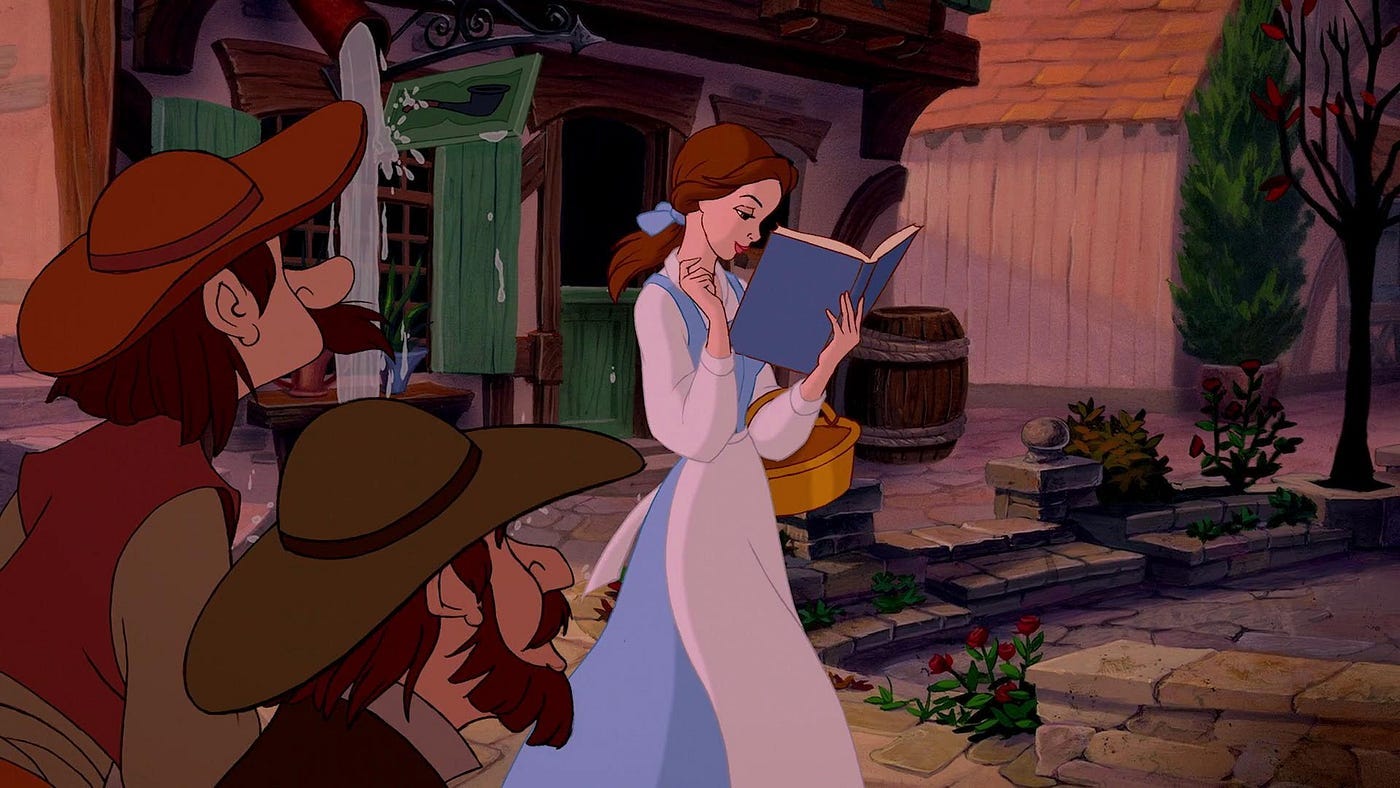
Today, the same remains true. Fiction, non-fiction, news, celebrity gossip, the hostile exchanges between neighbors on the Nextdoor app about trash cans being left out too long… whatever she can find.
My mom’s an information seeker through and through. Driven by a deep desire to learn new things; to expand her understanding of the world around us. And, occasionally, finding entertainment courtesy of the trash can trolls, but that’s a post for another day.
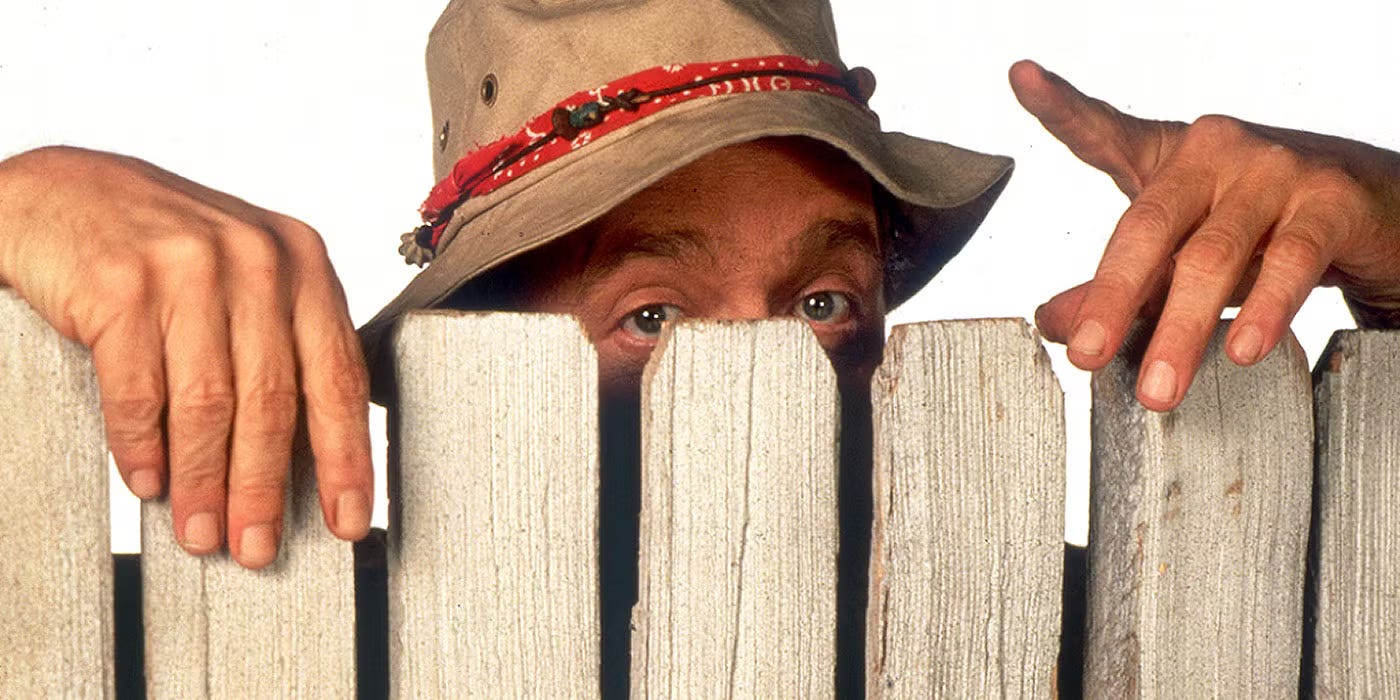
For decades, I’ve heard my mom admire this same trait reflected in others. When she does, it always boils down to an appreciation for their “intellectual curiosity.” When she recognizes a friend’s interest in metaphorically wearing the shoes of another, she lights up.
Frankly, it’s pretty adorable how excited she gets about other people’s desire to learn.
At this point, “intellectual curiosity” has become so ubiquitous in our conversations that we devolve into giggles before the words are spoken.
Despite the silliness associated with the phrase in our exchanges, I’ve long appreciated my mom's innate encouragement to seek information, often through books.
Throughout childhood and adolescence, I was never pushed to read a particular genre or finish books that I found uninteresting.
The underlying message was simply:
Books can take you places; let them.
Not hard to imagine how I ended up writing my own book now, is it?
Just this week, after intellectual curiosity once again entered our conversations, I saw an Instagram post that stopped me in my tracks.
Sidenote: The algorithm means I rarely see what my friends post anymore, but I’m constantly served ads for dog dental health treats and cheap international flights (weird combo, but very on-brand for me).
I was intrigued by this post — primarily because it had nothing to do with canine gingivitis. It was a New York Times Opinion essay about reading.
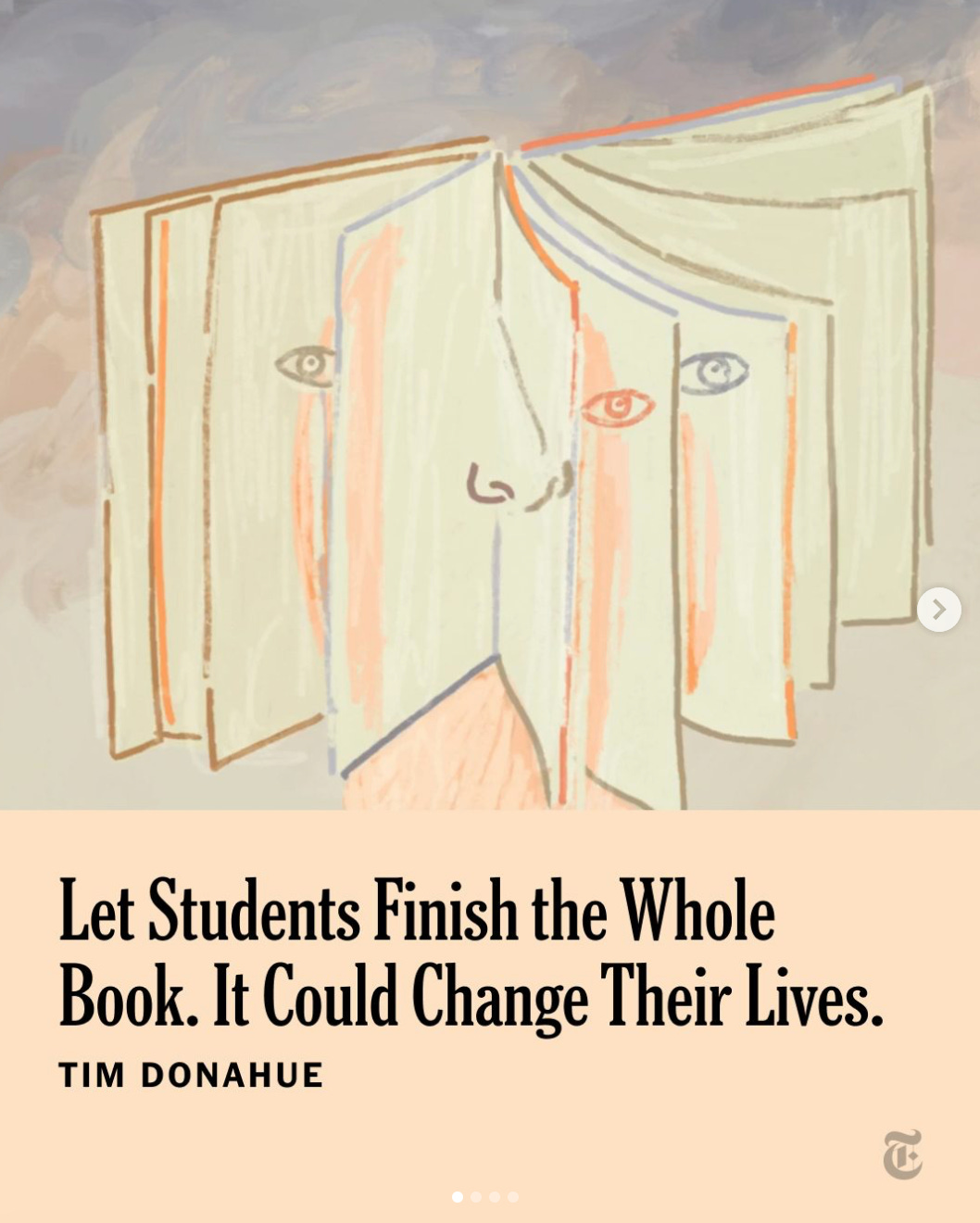
Let Students Finish the Whole Book, written by Tim Donahue, a high school English teacher of over twenty years, highlights the disadvantage of dissecting reading assignments.
“What might have been a full read of “The Great Gatsby” is replaced by students reading the first three chapters, then listening to a TED Talk on the American dream, reading a [poem]…and then…delivering a PowerPoint presentation on the Prohibition. They’ll experience Chapters 4 through 8 only through plot summaries and return to their texts for the final chapter.”
Now, I’m no stranger to the feeling that the borderline-ancient tomes they had us read in my AP English classes were wildly dense and often only palatable in chunks, paired with supplemental context materials. Here’s looking at you, Dostoevsky and Tolstoy, but….
THREE chapters? Of a 200-page book that isn’t haughtily written like Shakespeare or Marlowe? Absolutely not, old sport.

I’ll jump off my high horse, I promise; give me a second…
Here’s the thing: As Donahue described, this haphazard approach stifles the ability to appreciate—and more importantly, comprehend—the English language and its narratives.
This is where the stats he shared smacked me in the face: “In 2023 only 14 percent of students said they read for fun almost every day, a drop of 13 percentage points since 2012.”1
Listen, this isn’t a post about the dismal state of the US education system or the disgraceful number of books being banned, but these numbers hurt my intellectually curious heart.
Like my mom, I’m a big fan of information-gathering (see also: I became an attorney). Unlike my mom, it didn’t start the moment I learned to read.
I’ve posted before that reading about the fictional elite of the Upper East Side in Gossip Girl inspired me to enjoy and pursue reading outside of school.
Embarrassing? Perhaps. But you know what? I read more books FOR FUN during the summer break that I discovered GG than I had all the summers before. Combined.
I found the magic, intangible thing that made me want to read in that book. Moreover, reading it (and the ones that followed), with its large cast of characters, heavy setting descriptions, and teens talking like adults in fast-moving dialogue, vastly improved my reading comprehension. But I would have never gotten there had I not completed the book that spurred my curiosity.
However, beyond reading books for fun, I wholeheartedly believe intellectual curiosity is a mindset, an attitude that can be fostered and developed.
For example, more often than not, when I’m watching a TV show or movie, I’ll hit pause while I deep-dive through Wikipedia rabbit holes wherever my mind takes me.

Is that actor’s accent real? Wow, they come from nobility! Huh, I don’t know anything about [insert city name here]. Is that costume historically accurate? Is that house real or a set? What is the etymology of [insert obscure word here]? Why are Scottish and Irish Gaelic so different? And on and on and on…
Basically, my brain has never moved past the toddler “why” phase.
If the above scenario sounds like you, but you’re a self-proclaimed “non-reader,” I have news: you are also intellectually curious. You’re trying to comprehend the world by sussing out information, but perhaps you are intimidated by books.
Brace yourself for this reality check. I bet you would enjoy reading if you stopped lying to yourself about one critical thing: what to read.
Many people think we must read something the collective yet amorphous “they” would approve of. So, when asked about a book, we respond with something that sounds important, intelligent, or influential.
Guess what? Nobody cares what you read. Plus, anybody who judges you for not being an expert in long-dead ancient writers is a pretentious a-hole.
I’m a big reader (and writer), but despite that, I carry some weird, socially imposed shame that I’ve never read some heavy hitters.
Jane Austen? Hardly know her. Emily’s sister Charlotte? Couldn’t be bothered. George Eliot? Only recently found out he was actually Mary Ann Evans.
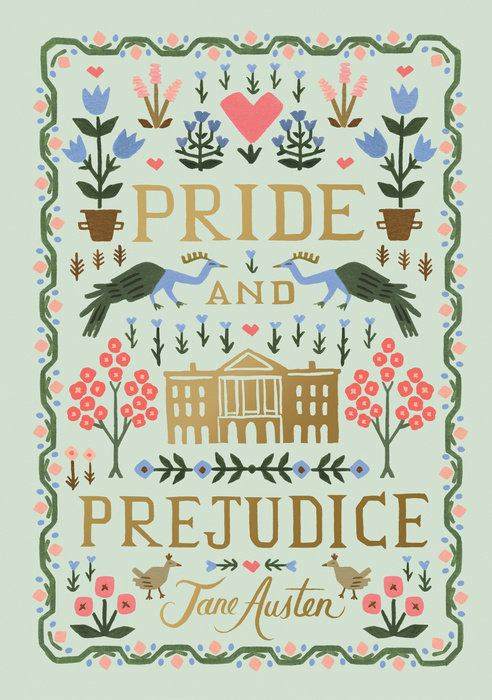
I mean, major props to these prolific writers of their time (especially because they were women), but believe it or not, I’m still ~a reader~ even without their titles under my belt. And that’s okay!
So, if you consider yourself empathetic, are interested in learning about the world around you, or are curious about specific topics or themes, try reading again.
And try again. Then try some more.
Don’t finish books that you find unsatisfying. Don’t muscle through titles simply because they make you sound like a polished socialite. Buy the book with the pretty cover. Read a novella if you’re strapped for time.
Find the thing —whatever it may be— that makes you want to read. Spy novels, romance, fantasy, memoirs about famous beekeepers.
Whatever floats your personal boat.
Ultimately, becoming or remaining intellectually curious means you care enough to embrace stories that are not your own with an open heart.
As Tim Donahue wrote, “Reading…is an important exercise in inferiority, an insistence on listening to something without imposing your own design on it. It’s a grounding and an ascension.”
Reading often leads to more reading, so (like my mom says) you never know where a single good book may take you. Soon, you too could end up with more books than you can store in your house, contemplating whether you *need* that dresser drawer of sweaters or if books would make better use of the space.
As I wrap up this far-too-long newsletter, here's my ask: if you have a book recommendation (or two) for the readers and non-readers of the audience of C’est La Vie, pop them into the comments.
Who knows, your recommendation might just become someone’s favorite book!
Until next time,
Megan
To encourage more people to read, I will start including a subsection in my newsletters with book recommendations. I already do this on Instagram, so why not here, too?
Book Recommendations
The Favorites by Layne Fargo (Fiction/Romance): A fast-paced, character-driven book with lots of scandal and drama. Childhood sweethearts turned champion ice dancers; there’s a chemistry-filled tension throughout their turbulent relationship on and off the ice. A contemporary retelling of Wuthering Heights, with a female main character who will stop at nothing to be the best, I was hooked after the first few pages!
This Time Tomorrow by Emma Straub (Fiction/Magical Realism): A heartfelt story of parent-child relationships and the eternal question, “Would I do life differently if I could do it all again?” Magical realism is like sci-fi light — time travel is the only magical element here. No fairies, ghosts, dragons, etc. Just real humans jumping between contemporary times. The story was moving, tender, and at times humorous. 2
“Let Students Finish the Whole Book,” by Tim Donahue, was posted in the New York Times Opinion section on February 16, 2025. A note about the quote shared: I would argue that the “almost every day” qualifier of the statistic provided may have skewed the number even lower than if it had been “weekly” or another measure (kids are busier than ever), but I am sharing what was provided in the research-backed article. Nevertheless, I imagine the number of kids reading books for fun at all in the US is probably still pretty low.
If you have any questions about content warnings, are looking for additional summary details, etc., I highly recommend using The Storygraph app (I find it way more user-friendly than Goodreads).





Here's a weird suggestion: Nighbitch. Start with the movie then read the book. It's a book that most moms will relate to, especially those who are in the toddler trenches or remember them well.